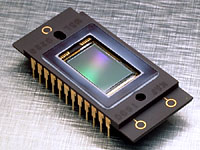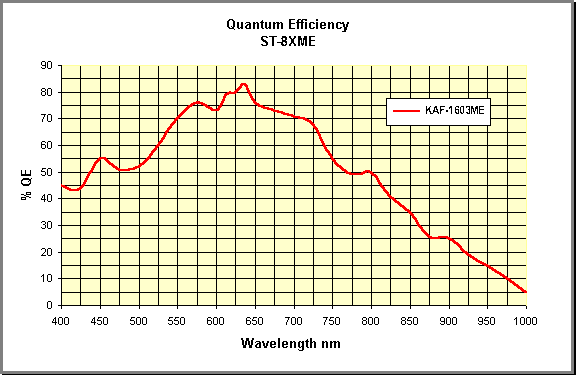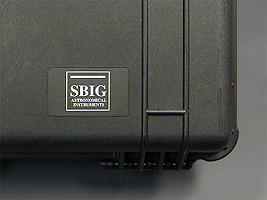|
|
Model ST-8XME Self-Guiding CCD camera |
ST-8XME and ST-8XMEI
Enhanced QE CCD Cameras
The Dual CCD ST-8XME and the
Single CCD ST-8XMEI
High Quantum Efficiency CCD Cameras
Like the ST-10XME and ST-7XME, the new ST-8XME is based upon Kodak's latest microlens technology that increases the effective QE of the CCD. The KAF-1603ME is now available for the model ST-8 cameras. This CCD features a peak QE of nearly 85%, 1530 x 1020 pixels at 9 microns square, and multiple AR coatings on the CCD window for increased light transmission and significantly reduced reflections. The ST-8XME camera also includes a TC-237H CCD with 657 x 495 pixels at 7.4 microns for self-guiding and a Remote Guiding Head Port. The ST-8XMEI is a single sensor camera with no guiding CCD, but it does include the Remote Guiding Head port. Although it is intended for industrial applications, it is also an excellent lower price alternative for astronomy where an external guider is used. Both models are available with a Class 2 or Class 1 CCD. Other than the cosmetic specifications, the Class 2 ME CCD has the same low noise and high QE as the Class 1.
 |
KAF-1603ME CCD |
For years, the model ST-8 camera was the flagship of the SBIG self-guiding models. This position was eventually taken over by the higher resolution ST-10XME and more recently by the much larger STL-11000M cameras, but the ST-8XME still has its place. At 100 inches or more of focal length, the 9 micron pixels of the ST-8XME each see about 0.7 arcseconds. It is unlikely that during typical seeing conditions where the FWHM of star images on long exposures are generally greater than 2.5 arcseconds, the smaller pixels of the ST-10XME will improve on the resolution of the ST-8XME at this focal length or longer, and while the ST-10XME will produce an image with twice as many pixels, the field of view is nearly the same. Also, the ST-8XME is well suited to TDI imaging. Alan Holmes has written an Application Note about TDI Imaging and Research applications that are perfect for the ST-8XME and ST-8XMEI cameras. TDI is particularly interesting because one can image large areas of the sky without guiding so any telescope will do. TDI stands for Time Delay Integration. Basically, one points the camera at an area of sky and turns off the telescope drive to let the stars drift across the field of view. The CCD is clocked in sync with the rate of drift and the resulting image has an exposure time equal to the amount of time it takes the stars to drift across the CCD. Depending on the focal length of the scope this can be many minutes. But there is no periodic error and no guiding error! Furthermore the image can just scroll as the sky moves past so the image file can be 1020 x 1000 or 1020 x 2000 etc. One gets a deeper image with a more sensitive CCD. In the case of the ST-8XMEI the extra QE of the microlensed CCD make it quite sensitive to dim objects and very good wide field astro images can be created with no tracking at all. All of this means the ST-8XME might be the best choice for imaging through longer focal lengths or for unguided TDI imaging at a significant savings compared to the ST-10XME.
 |
Other than the guiding CCD and included accessories, the ST-8XME and ST-8XMEI are the same camera. A table comparing the features of the ST-8XME and ST-8XMEI can be found below.
Improved Features
Large Built-In Tracking CCD: The Self-Guiding model uses the TC-237H tracking CCD which is now standard in all of our self-guiding cameras. The TC-237H array is 657 x 495 pixels at 7.4 microns. The TC-237H is 2.7X larger than the TC-211 CCD which means there is a more than double the chance you will find suitable guide stars anywhere you happen to be looking without having to hunt. In the tracking configuration, the TC-237H CCD will normally be binned 2x2 for increased sensitivity. When binned 2x2 the field of view remains 2.7X that of the TC-211 however as the pixel size is increased to 14.8 microns. The user may also use the TC-237H CCD in high resolution (unbinned) mode if desired. ThsSky software from Software Bisque automatically generates finder charts showing the correct placement of the guiding CCD field of view relative to the imaging CCD's field of view. Using this tool to plan your nights imaging is a great compliment to the self-guiding cameras. When guiding with the TC-237H tracking CCD, the imaging CCD spends 100% of its time and quantum efficiency gathering the image. You are not required to compromise by giving up half of the quantum efficiency or by making twice the exposure time as you might with other self-guiding designs.
Upgradeability: The standard ST-8XME comes with a Class 2 CCD with no column defects. The ST-8XMEI may be upgraded to a dual CCD camera for self-guiding at any time. Current owners of ST-7 and ST-8 cameras may upgrade to the ST-8XME if they already have USB electronics. The cost to upgrade the CCD only is $1995. Others may upgrade to USB electronics and ME CCD at the same time for an additional $995. Adding the TC-237H guiding CCD to a USB camera (or concurrent to a USB upgrade) costs $395. Final upgrade costs depend on the existing camera configuration. Check with SBIG for the latest upgrade pricing.
 |
| Custom Carrying and Storage Case |
Improved Carrying and Storage Case: The ST-8XME model includes a high quality carrying and storage case made for SBIG by Pelican. The custom cut foam securely holds the camera and power supply with additional spots for accessories, cables, etc. The case is dust proof, water proof, crush proof and carries a lifetime guarantee from the manufacturer. The case is optional for the ST-8XMEI.
 |
The 25mm F/16 lens assembly screws into |
Optional Accessory Test Lens: To make testing of the camera easier we have designed an optional low cost test lens that screws into the t-thread front end of the camera. This is a handy accessory for learning the various camera functions in the day time if you do not have a camera lens adapter. See our Test Lens Product Announcement for more details.
Optional Accessories: The ST-8XME cameras support a variety of professional accessories. Each model contains a ROM programmed to support the CFW8A Color Filter Wheel for automatic RGB or LRGB imaging when attached to the camera. Each model also has electronic relays built-in so that the cameras can be used as autoguiders for film astrophotography or for guiding other CCD cameras. The built-in TC-237H guiding CCD in the ST-8XME model enables the use of both the AO-7 Adaptive Optics Device and the SGS Self-Guiding Spectrograph. The Self-Guiding Spectrograph was designed to give maximum resolution with 9 micron pixels. Several camera lens adapters are available from SBIG for attaching a variety of 35mm camera lenses directly to the ST-8 without the filter wheel for wide field imaging. Third party manufacturers support the ST-8XME and CFW8A color filter wheel combination with camera lens adapters as well.
Packages and Price
(1) The ST-8XME Model uses a Class 2 ME CCD with high QE and no column defects. It includes the built-in TC-237H tracking CCD, custom carrying case, water cooling heat exchanger, relay adapter plug, relay cables for self-guiding, universal power supply, and extra software.
(2) The ST-8XMEI is the single sensor version with no internal guiding CCD. The imaging CCD is a Class 2 KAF-1603ME. Like the ST-7XEI, this single CCD version is an ideal way to get started with a professional quality camera at a reasonable price or for anyone who may already have a guiding solution such as the STV or another CCD camera. It is also an excellent TDI imager. A TC-237H tracking CCD, water cooling and custom case may also be added at any time.
Click here for the current price list.
ST-8XME Comparison Chart |
||
| ST-8XMEI | ST-8XME | |
| High QE (>80% Peak) "ME" CCD | Class 2 | Class 2 |
| Column defects allowed | none | none |
| High Speed USB Interface | l | l |
| Internal shutter for automatic dark frames | l | l |
| Internal ROM for CFW8A control | l | l |
| Regulated thermoelectric cooling with fan | l | l |
| Universal Power Supply | l | l |
| USB Cable | l | l |
| Adjustable t-thread interface block | l | l |
| 2" nosepiece with t-thread base | l | l |
| CCDOPS ver.5 software on CD-ROM | l | l |
| CCDOPS ver.5 manual on CD-ROM | l | l |
| Camera Operating Manual on CD-ROM | l | l |
| TheSky v.5 software on CD-ROM | l | l |
| CCDSoftV5 software on CD-ROM | l | l |
| TC-237H Tracking CCD (657x495 at 7.4u) | $395 | l |
| Custom Pelican Carrying Case | $149 | l |
| Water Cooling Heat Exchanger | $99 | l |
| ST-7RC Adapter and Relay Cable | $9 | l |
| Printed CCDOPS ver.5 manual | $15 | $15 |
| Printed Camera Operating Manual | $15 | $15 |
| 1.25" nosepiece | $49 | $49 |
| Test lens | $19 | $19 |
| * Prices and specifications
are subject to change without notice. Please refer to the SBIG price list for latest pricing. |
||
Each ST-8XME camera system includes the following:
* Rugged camera body
with new high speed analog and digital electronics
* New High QE Class 2 KAF-1603ME imaging CCD with no column defects
* Built-in TC-237H CCD autoguider with 2.7X the area and 10X the sensitivity
of an ST-4
* High speed USB 1.1 interface (full frame download in ~ 3.6 seconds).
* New Remote Guide Head Port
* New I2C bi-directional expansion port
* Standard accessory / telescope port
* User rechargeable desiccant plug
* Internal shutter
* 2" Nosepiece
* Cooling Fan - on/off controlled by software
* New heat exchanger design with water cooling capability
* Tripod mount 1/4-20 threaded side plate
* Adjustable t-thread ring
* 15 foot USB cable (third party USB extenders available for up to 500
meters!)
* Telescope interface cable (for autoguiding)
* Universal Power supply
* SBIG's CCDOPS version 5 camera control software
* Software Bisque's CCDSoftV5 camera control and image processing software
* Software Bisque's TheSky v5, Level II
* Printed Operating Manuals
* Custom design Pelican carrying case with pre-cut foam for your camera and
accessories
* One Year Warranty Parts and Labor
* Demo CD-ROM with sample images and software
Each ST-8XMEI camera includes the following:
* Rugged camera body
with new high speed analog and digital electronics
* New High QE Class 2 KAF-1603ME imaging CCD
* High speed USB interface (full frame download in ~ 3.6 seconds)
* New Remote Guide Head Port
* New I2C bi-directional expansion port
* Standard accessory / telescope port
* User rechargeable desiccant plug
* Internal shutter
* 2" Nosepiece
* Cooling Fan - on/off controlled by software
* Tripod mount 1/4-20 threaded side plate
* Adjustable t-thread ring
* 15 foot USB cable (third party USB extenders available for up to 500
meters!)
* Universal Power supply
* SBIG's CCDOPS version 5 camera control software
* Software Bisque's TheSky version 5, level II
* Operating Manuals on CD-ROM
* One Year Warranty Parts and Labor
Model ST-8XME and ST-8XMEI
Typical Specifications
CCD |
|
| CCD |
Kodak KAF-1603ME + TI TC-237 |
|---|---|
| Pixel Array | 1530 x 1020 pixels |
| CCD Size | 13.8 x 9.2 mm |
| Total Pixels | 1.6 million |
| Pixel Size | 9 x 9 microns square |
| Full Well Capacity | ~100,000 e- |
| Dark Current | 1e-/pixel/sec at 0 degrees C. |
| Antiblooming | Optional (KAF-1601LE) |
Readout Specifications |
|
| Shutter | Electromechanical |
|---|---|
| Exposure |
0.12 to 3600 seconds, 10ms resolution |
| Correlated Double Sampling | Yes |
| A/D Converter | 16 bits |
| A/D Gain | 2.3e-/ADU |
| Read Noise | 15e¯ RMS |
| Binning Modes | 1 x 1, 2 x 2, 3 x 3 |
| Pixel Digitization Rate |
Up to 420.000 pixels per second |
| Full Frame Download | ~3.7 seconds |
System Specifications |
|
|---|---|
| Cooling - standard |
Single Stage Thermoelectric, Active Fan, Water Assist -45 C from Ambient Typical with water, -35 C w/air only |
| Temperature Regulation | ±0.1°C |
| Power |
5VDC at 1.5 amps, +/-12VDC at 0.5 amps, power supply included |
| Computer Interface | USB 1.1 |
| Computer Compatibility |
Windows 98/2000/Me/XP Mac OS-X / Vista 32 bit |
| Guiding |
Dual CCD Self-Guiding with built-in TC-237 CC |
Physical Dimensions |
|
|---|---|
| Optical Head |
5 inches diameter x 3 inches 12.5 cm diameter x 7.5 deep |
| CPU |
All electronics integrated into Optical Head, No CPU |
| Mounting |
T-Thread, 2" nosepieces included |
| Weight | Approx. 2 pounds/0.9kg |
| Backfocus | 0.92 inches / 2.3 cm |
Revised:
October 06, 2008 12:53:02 PM.
Copyright © 2004 Santa Barbara Instrument Group, Inc. All rights reserved.
Please report any problems with this page directly to the Webmaster